Tarps, commonly known as tarpaulins, are a ubiquitous and essential element in the industrial and construction landscapes. Renowned for their versatility and resilience, these coverings serve a multitude of purposes, ranging from protective to practical. This blog post aims to delve into the extensive applications of tarps in industrial and construction environments, highlighting their indispensable role in safeguarding equipment and preserving building materials.
The Indispensable Tarpaulin
A Brief History
Tarpaulins have been around for centuries. Originally made from tar-coated canvas, which gave them their waterproof quality, modern tarps are typically made from plastics like polyethylene or PVC. This evolution in material has enhanced their durability, water resistance, and versatility.
Material Matters
The choice of material for a tarp depends on its intended use. Poly tarps are popular due to their affordability and flexibility, while heavy-duty vinyl tarps are preferred in harsher environments for their strength and UV resistance.
Tarps in Industrial Settings
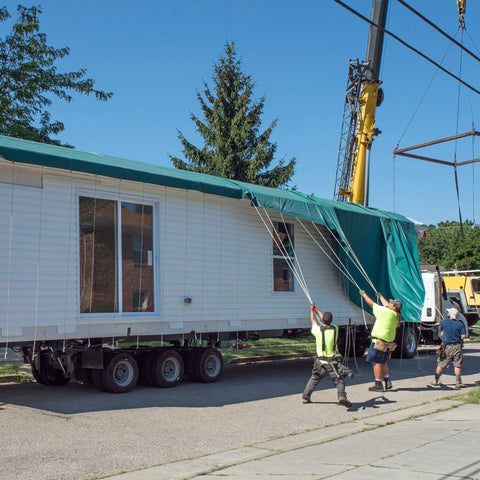
In the industrial sector, tarps are often employed for their protective qualities. They shield machinery and raw materials from environmental elements like rain, wind, and sun, thereby preventing rust, corrosion, and other forms of degradation. This protection is not only crucial for maintaining the integrity of the equipment but also for ensuring the safety of the workers operating these machines.
Equipment Protection
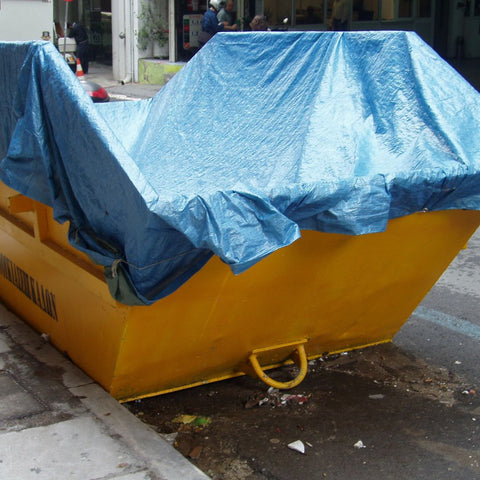
In industrial environments, machinery and equipment represent significant investments. Tarps play a vital role in protecting these assets from the elements, dust, and debris, especially when stored outdoors or in unsealed spaces. This protective measure not only prolongs the life of the equipment but also ensures operational efficiency and safety.
Storage and Warehousing
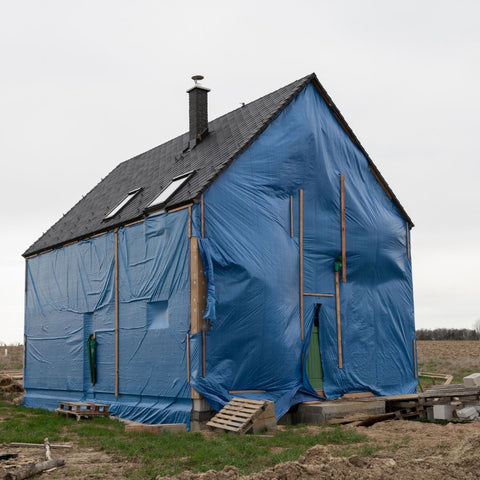
Tarps are extensively used in the storage and warehousing of raw materials and finished goods. They provide a temporary yet effective barrier against moisture, dust, and other contaminants, keeping stored items in pristine condition.
Containment and Environmental Protection
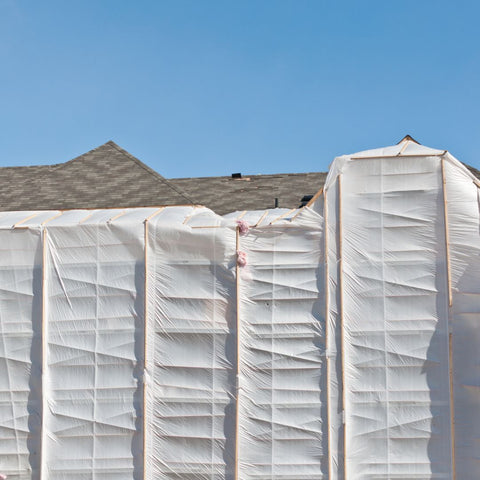
Industries dealing with environmentally sensitive materials or processes often use tarps for containment. These tarps help in complying with environmental regulations by preventing spills or leaks from contaminating surrounding areas.
Tarps in Construction
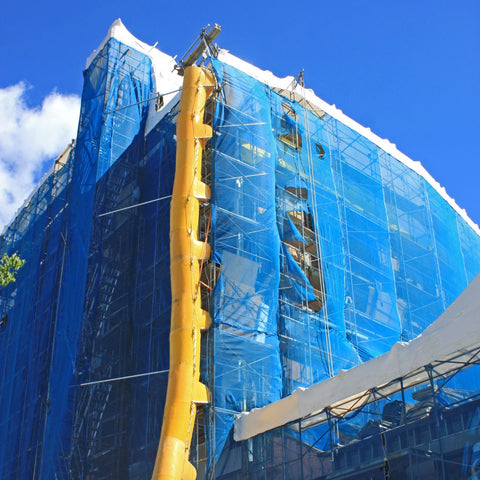
The construction industry, known for its dynamic and often harsh working conditions, finds tarps equally invaluable. Here, they are used to cover building materials, safeguarding them from moisture, dust, and other contaminants that could compromise their quality. This is especially critical for materials susceptible to damage, such as wood, insulation, and certain types of metal.
Building and Construction Sites
The construction industry finds multiple uses for tarps. They are commonly used to cover incomplete structures, providing temporary protection from weather elements and helping to maintain a dry work environment. This is crucial for certain construction processes that require dry conditions.
Scaffolding Enclosures
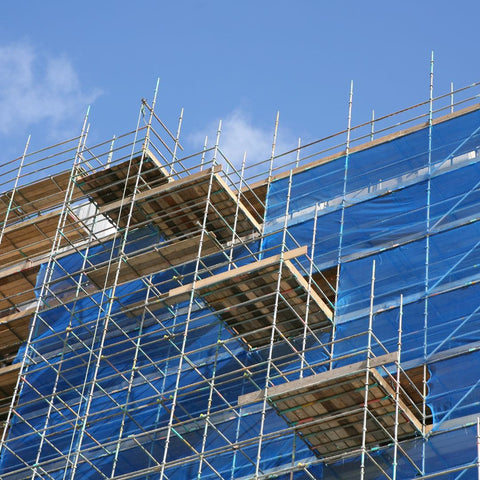
Tarps are used to create enclosures around scaffolding structures. This serves multiple purposes: it provides a shield against weather, enhances safety by catching falling debris, and can even offer a degree of temperature control.
Ground Covers
During excavation or groundwork, tarps are used to cover the soil to prevent erosion or contamination. They also aid in segregating different materials and ensure a cleaner, more organized worksite.
The utility of tarps extends further with their use as temporary shelters or curtains in construction sites. They provide workers with respite from the elements, enhance privacy, and reduce the spread of dust and debris during demolition or renovation activities.
Another notable application of tarps in these sectors is in environmental protection. During projects that involve painting, sandblasting, or other potentially polluting activities, tarps are used to contain spills, drips, and airborne particles, minimizing the environmental impact of these operations.
Best Tarps for Industrial and Construction from Tarp Supply Inc.
Poly Tarps
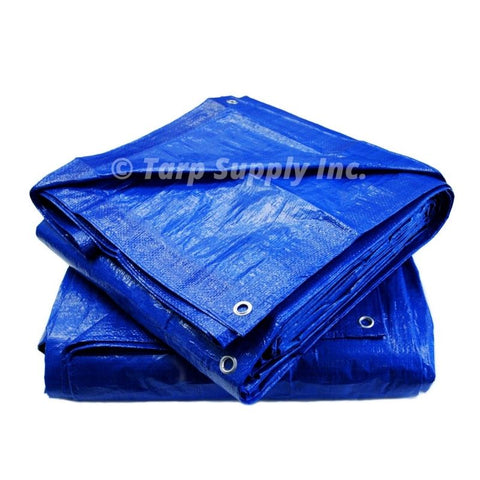
Poly tarps, short for polyethylene tarps, are highly valued in industrial and construction settings due to their numerous beneficial qualities. Here are some key attributes that make poly tarps well-suited for these demanding environments:
Durability: Poly tarps are known for their exceptional durability. They are resistant to tearing and puncturing, which is crucial in industrial and construction sites where sharp objects and rough handling are common.
Water Resistance: One of the primary qualities of poly tarps is their water resistance. They provide excellent protection against rain, which is essential for keeping construction materials dry and preventing water damage.
UV Protection: Many poly tarps are treated to be UV resistant. This is important in outdoor settings where prolonged exposure to sunlight can degrade materials. UV protection ensures that the tarps themselves, as well as the materials they cover, are shielded from sun damage.
Chemical Resistance: These tarps are often resistant to a variety of chemicals, making them suitable for use in industrial environments where they may come into contact with oils, acids, and other potentially damaging substances.
Mildew and Rot Resistance: Polyethylene does not support the growth of mildew or rot, which is important in environments where the tarps might be exposed to moisture for extended periods.
Versatility: Poly tarps come in various thicknesses and strengths, which makes them adaptable for a wide range of applications, from covering machinery and equipment to creating temporary shelters or barriers.
Lightweight and Easy to Handle: Despite their strength and durability, poly tarps are relatively lightweight and easy to maneuver. This makes them easy to transport and set up, which is highly beneficial in fast-paced construction environments.
Cost-Effective: Compared to other tarp materials, polyethylene is relatively inexpensive. This cost-effectiveness is a significant advantage in industrial and construction settings where large quantities of tarps might be needed.
Easy Maintenance: Poly tarps are easy to clean and maintain. They can be simply wiped down or hosed off, which is convenient in industries where time and ease of maintenance are critical factors.
Reusable: These tarps can often be used multiple times, which is not only cost-effective but also environmentally friendly, as it reduces the need for constant replacement and disposal of used materials.
Vinyl Tarps
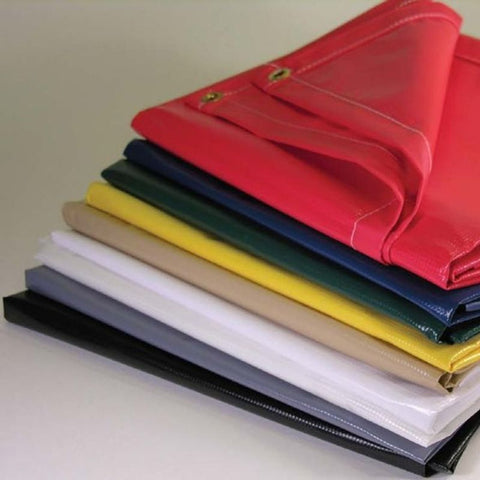
Vinyl tarps are highly valued in industrial and construction settings due to their unique qualities that make them suitable for various demanding applications. Here are some of the key qualities of vinyl tarps that make them ideal for industrial and construction use:
Durability: Vinyl tarps are known for their exceptional durability. They are made from high-strength, industrial-grade material that can withstand harsh conditions, including heavy wear and tear. This makes them ideal for construction sites where they might be subject to rough handling.
Waterproof and Weather-Resistant: One of the most significant qualities of vinyl tarps is their ability to resist water and moisture. This waterproof nature ensures that anything covered by these tarps remains dry, which is crucial in protecting materials and equipment in construction sites. Additionally, they can withstand various weather conditions, including strong winds, heavy rain, and even snow.
UV Resistance: Exposure to sunlight can degrade many materials, but vinyl tarps are often treated to be UV resistant. This means they can be used for prolonged periods in outdoor settings without losing strength or color due to sun exposure.
Chemical and Oil Resistance: In industrial environments, exposure to chemicals and oil is common. Vinyl tarps are resistant to many chemicals and oils, making them suitable for use in such environments without degrading.
Mildew and Rot Resistance: The material used in vinyl tarps is resistant to mildew and rot, which is particularly important in damp or humid conditions often found in construction areas.
Tear Resistance: Vinyl tarps are designed to resist tearing. This is essential in construction settings where sharp edges and rough surfaces are commonplace.
Versatility: The flexibility of vinyl tarps makes them easily adaptable to various shapes and sizes, suitable for covering irregularly shaped objects. This versatility is essential in construction and industrial settings where custom solutions are often required.
Ease of Maintenance: Vinyl tarps are relatively easy to clean and maintain. They can be wiped down or hosed off, which is an important consideration in industrial environments where tarps may become soiled with dust, dirt, or other substances.
Flame Retardant Properties: Many vinyl tarps come with flame retardant properties, making them safe for use in environments where there is a risk of fire.
High Weight-to-Strength Ratio: Despite being lightweight, vinyl tarps are incredibly strong, making them easy to handle and transport, which is a crucial factor in fast-paced construction environments.
Maintenance and Longevity
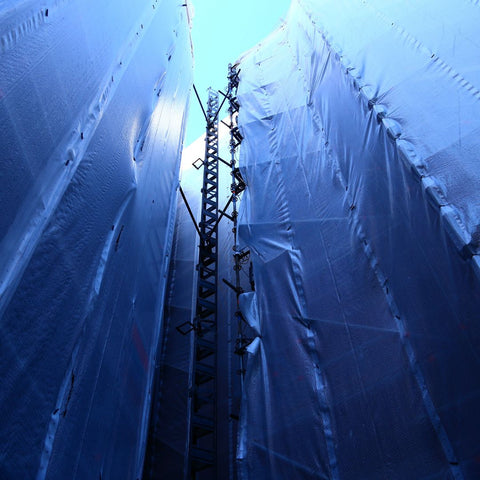
Regular Maintenance
To maximize the benefits of tarps, regular maintenance is key. This includes cleaning, checking for tears or weaknesses, and proper storage when not in use. Regular maintenance extends the life of a tarp, ensuring it remains effective in its protective role.
The Importance of Quality
Investing in high-quality tarps can yield long-term savings. Cheaper, lower-quality tarps might not withstand the rigors of industrial and construction use, leading to frequent replacements.
Conclusion
Tarps are more than just pieces of waterproof material; they are essential tools in industrial and construction settings. Their ability to protect equipment and materials makes them invaluable. The versatility and durability of modern tarps have made them indispensable in these sectors. As industries continue to evolve, so too will the applications of tarps, adapting to new challenges and needs.
By understanding the various uses and maintenance requirements of tarps, industries can ensure they are maximizing the benefits of this simple yet powerful tool. The humble tarp, with its rich history and modern adaptations, continues to be a silent yet significant contributor to the success of industrial and construction projects worldwide.





